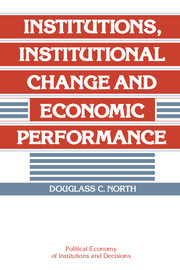Series editor's preface
Published online by Cambridge University Press: 05 June 2012
Summary
The Cambridge Series in the Political Economy of Institutions and Decisions is built around attempts to answer two central questions: How do institutions evolve in response to individual incentives, strategies, and choices, and how do institutions affect the performance of political and economic systems? The scope of the series is comparative and historical rather than international or specifically American, and the focus is positive rather than normative.
In this challenging theoretical work, Douglass North examines how to explain the vastly different performances of economies over long periods of time. Asking “What combination of institutions best permits capturing the gains from trade?”, he offers a broad perspective on how institutions persist and change, superseding his own earlier work on incentives toward efficient institutions. Now his focus is on the interaction of institutions, defined as any constraint humans devise to shape their interactions, and organizations, created to take advantage of the opportunities presented by institutions in shaping the development of economies. The importance of institutions arises from the costliness of measuring what is valuable, protecting rights, and policing and enforcing agreements. Once created, institutions determine the costs of acting in various ways in political and economic contexts. North applies his theories of the interplay between institutional evolution and political and economic organization to a range of historical examples, including the development of management structures, law merchants, insurance, and financial markets.
- Type
- Chapter
- Information
- Publisher: Cambridge University PressPrint publication year: 1990

